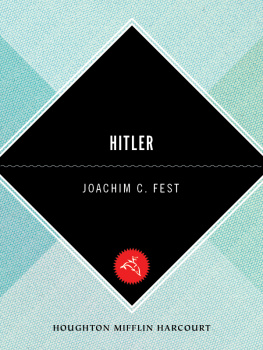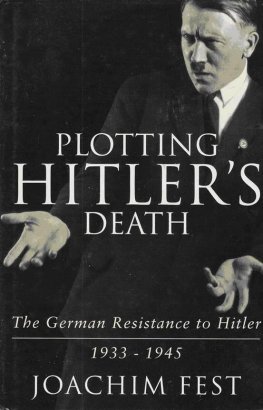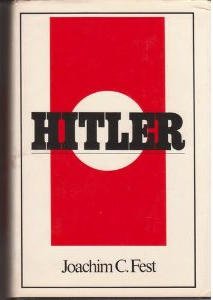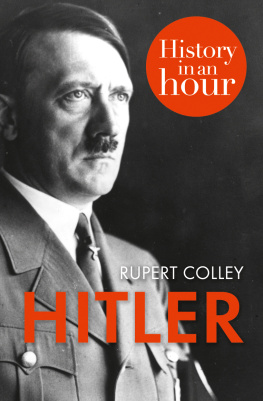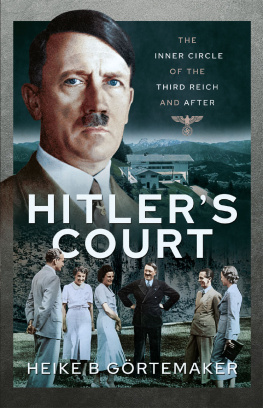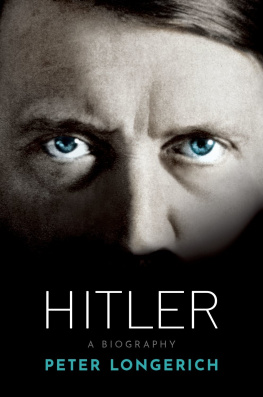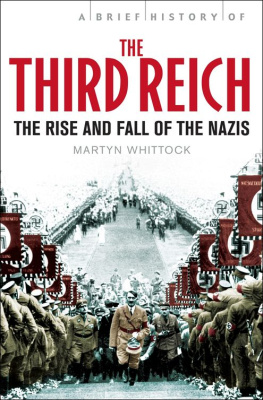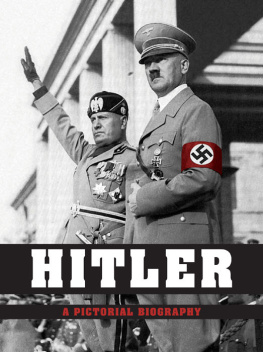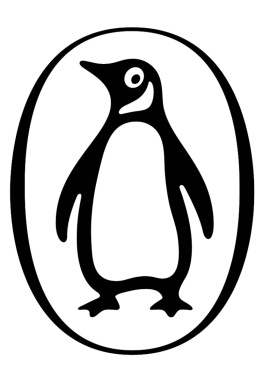Copyright 1973 by Verlag Ullstein
English translation copyright 1974 by Harcourt, Inc.
All rights reserved. No part of this publication may be reproduced or transmitted in any form or by any means, electronic or mechanical, including photocopy, recording, or any information storage and retrieval system, without permission in writing from the publisher.
For information about permission to reproduce selections from this book, write to Permissions, Houghton Mifflin Harcourt Publishing Company, 215 Park Avenue South, New York, New York 10003.
www.hmhbooks.com
Quotations throughout the book are from Mein Kampf by Adolf Hitler, translated by Ralph Manheim.
Copyright 1943 and renewed 1971 by Houghton Mifflin Company.
Reprinted by permission of Houghton Mifflin Company.
All rights reserved.
The Library of Congress has cataloged the print edition as follows:
Fest, Joachim C. 1926
Hitler.
A Helen and Kurt Wolff book.
1. Hitler, Adolf, 18891945.
DD247.H5F4713 943.086'092'4 [B] 73-18154
ISBN 978-0-15-141650-9
ISBN 978-0-15-602754-0 (pb.)
e ISBN 978-0-544-19554-7
v1.0313
Prologue
Hitler and Historical Greatness
Leopold von Ranke
History records no phenomenon like him. Ought we to call him great? No one evoked so much rejoicing, hysteria, and expectation of salvation as he; no one so much hate. No one else produced, in a solitary course lasting only a few years, such incredible accelerations in the pace of history. No one else so changed the state of the world and left behind such a wake of ruins as he did. It took a coalition of almost all the world powers to wipe him from the face of the earth in a war lasting nearly six years, to kill himto quote an army officer of the German resistancelike a mad dog.
Hitlers peculiar greatness is essentially linked to the quality of excess. It was a tremendous eruption of energy that shattered all existing standards. Granted, gigantic scale is not necessarily equivalent to historic greatness; there is power in triviality also. But he was not only gigantic and not only trivial. The eruption he unleashed was stamped throughout almost every one of its stages, down to the weeks of final collapse, by his guiding will. In many speeches, he recalled, with a distinctly rapturous note, the period of his beginnings, when he had nothing at all to back (him), nothing, no name, no fortune, no press, nothing at all, nothing whatsoever, and how, entirely by his own efforts, he had risen from poor devil to rule over Germany and soon over part of the world as well. That has been almost miraculous!
He also had an amazing instinct for what forces could be mobilized at all and did not allow prevailing trends to deceive him. The period of his entry into politics was wholly dominated by the liberal bourgeois system. But he grasped the latent oppositions to it and by bold and wayward combinations seized upon these factors and incorporated them into his program. His conduct seemed foolish to political minds, and for years the arrogant Zeitgeist did not take him seriously. The mockery he earned was justified by his appearance, his rhetorical flights, and the theatrical atmosphere he deliberately created. Yet in a manner difficult to describe he always stood above his banal and dull-witted aspects. One particular source of his strength lay in his ability to build castles in the air with an intrepid and acute rationality.
In 1925, Hitler had been sitting in a furnished room in Munich, a failed Bavarian local politician, drawing his sketches of imaginary arches of triumph and domed halls. In spite of the collapse of all his hopes after the attempted putsch of November, 1923, he did not take back a single one of his words, did not mute his battle cry, and refused to modify any of his plans for domination of the world. In those days, he later remarked, everyone had branded him a visionary. They always said I was crazy. But only a few years later everything he had wanted was reality, or at any rate a realizable project, and those institutions that had recently seemed to be permanent and unchallenged were on their way out: democracy and political-party government, unions, international workers solidarity, the European system of alliances, and the League of Nations. Who was right? Hitler triumphantly demanded. The visionary or the others?I was right.
In this ability to uncover the deeper spirit and tendencies of the age, and to represent those tendencies, there certainly is an element of historic greatness. It appears to be the destiny of greatness, Jacob Burckhardt wrote in his famous essay on historical greatness, in Reflections on History, that it executes a will going beyond individual desires. Burckhardt speaks of the mysterious coincidence between the egoism of the individual and the communal will. In general terms and at times in specific details, Hitlers career seems like a classic illustration of this tenet. The following chapters contain a wealth of evidence of that. The same is true for the other elements that in Burckhardts view constitute historical greatness. Irreplaceability is one; he leads a people from one stage of cultivation to another. He stands not only for the program and the fury of a party, but for a more general aim. He manifests the ability to jump boldly across the abyss; he has the capacity of simplification, the gift of distinguishing between real and illusory powers, and finally the exceptional will power that creates an atmosphere of fascination. Contest at close quarters becomes utterly impossible. Anyone desiring to oppose him must live outside of the reach of the man, with his enemies, and can meet him only on the battlefield.
We may surely ask whether the absolute crime of mass extermination planned and committed by Hitler is not of an utterly different nature, overstepping the bounds of the moral context recognized by both Hegel and Burckhardt. Our doubts of Hitlers historic greatness also spring from another factor. The phenomenon of the great man is primarily aesthetic, very rarely moral in nature; and even if we were prepared to make allowances in the latter realm, in the former we could not. An ancient tenet of aesthetics holds that one who for all his remarkable traits is a repulsive human being, is unfit to be a hero. It may beand evidence will be offeredthat this description fits Hitler very well. His many opaque, instinctual traits, his intolerance and vindictiveness, his lack of generosity, his banal and naked materialismpower was the only motive he would recognize, and he repeatedly forced his table companions to join him in his scorn of anything else as boshand in general his unmistakably vulgar characteristics give his image a cast of repugnant ordinariness that simply will not square with the traditional concept of greatness. Impressiveness in this world, wrote Bismarck in a letter, is always akin to the fallen angel who is beautiful but without peace, great in his plans and efforts, but without success, proud and sad. If this is true greatness, Hitlers distance from it is immeasurable.
It may be that the concept of greatness has become problematical. In one of the pessimistically toned political essays Thomas Mann wrote in exile, he used the terms greatness and genius in regard to a then triumphant Hitler, but he spoke of botched greatness and of a debased stage of genius. In such contradictions a concept takes leave of itself. Perhaps this idea of greatness also springs from the historical consciousness of a past era, which placed almost all its weight on the actors and ideas of the historical process and almost none on the extensive network of forces.
Today this tendency is reversed, and we ascribe little importance to personality compared with the interests, relationships, and material conflicts within the society. This approach has also been applied to Hitler. Thus he has been portrayed as the hireling or sword arm of capitalism, who organized the class struggle from above and in 1933 subjugated the masses, who had been pressing for political and social self-determination. Later, by unleashing the war, he carried out the expansionist aims of his employers. In this story, which has been presented in a great many variants, Hitler appears as totally interchangeable, the most vulgar of tin soldiers, as one of the leftist analysts of Fascism wrote as early as 1929. For the proponents of this theory he was, at any rate, merely one factor among others, not a determining cause.
Next page
